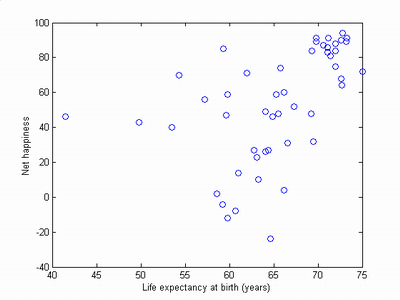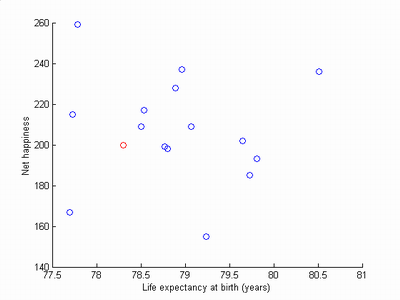December 27, 2006
A Long and Happy Life
During my talk in second life I claimed that if long lives produced ennui, we ought to see that in our happiness statistics. Here is a look at the link between current life expectancy and happiness.
Nationmaster is an excellent tool to play with, although I find some of its plots somewhat useless (I want more control over them). NationMaster - Scatterplot: Lifestyle > Happiness net vs Lifestyle > Life satisfaction for example messes things up seriously, despite the cheerful claim that it is all significant.
Taking the happiness and life expectancy numbers and plotting them together we get this:

The correlation is 0.488 ± 0.0140 (where I used jackknifing to get the standard deviation estimate). The biggest outlier is Nigeria which is surprisingly happy despite everything, a bit like Bangladesh, Ghana and India on the same horisontal 'short-lived but happy' branch. The lower 'sad-but-reasonably-long-lived' branch is Eastern europe with Bulgaria as the most extreme case. But in general the correlation is pretty clear: the longer you live, the happier you tend to be. The most long-lived countries are also happiest.
But maybe we are seeing a confound due to the disparities in wealth and health here? If we take the Eurobarometer data instead and look at EU countries (all generally wealthy and healthy), we get this scatter:

The red circle is EU averages. The happiness value here is calculated as summing the not at all satisfied weighted by 0, the not very satisfied by 1, fairly satisfied by 2 and the very satisfied by 3; a measure adding the two most positive classes and subtracting the most negative as in the first diagram does not change anything qualitatively.
We actually get a negative correlation now, -0.0679 ± 0.1009, but as the standard deviation shows this is not significantly different from no correlation.
Denmark is perhaps a bit of an outlier in terms of being very satisfied but not living long compared to neighbours. See Why Danes are smug: comparative study of life satisfaction in the European Union (Christensen et al., BMJ 2006;333:1289-1291 23 December) for a deeper analysis. Myself, I blame the smørrebrød. We Swedes are of course both long-lived and happy (despite the extreme level of sick leave).
So the data supports my claim that at least given current life expectancies there is no sign that people live long lives of ennui.
I have not yet analysed historical data, since that would be an even better way of testing whether rising life expectancies are linked to declining levels of happiness. Given that plots of life satisfaction generally remain fairly stable in most EU countries while life expectancy increases linearly with time, it seems unlikely that there is any correlation hidden there. The real test would be to look at countries that have experienced major gains in life expectancy over the last century, but happiness data are hard to find. We need to investigate some good proxy to see if there has been a major change in lifespan-related happiness.
Further, we should look at life satisfaction as a function of age. A quick look into the World Values Survey does not show a strong difference between the happiness of young, middle aged and old. Comparing different countries I got the impression that in richer countries people moved towards "very happy" as they aged while in less rich countries people moved away. A longitudinal study shows that life satisfaction peaks around 65, but is highly individual as personality factors and health play a big role. Poor health, loneliness and economical problems appear to be major predictors for less satisfaction in old age, and since presumably these problems are easier to fix in affluent societies that may contribute the change. But we could of course get complex confounders here due to different family patterns in different countries.
So far longer healthier lives do not look like they promote ennui. Maybe a radically longer life could do it, but given that we so far have not had any actual experience of it the predictions of pro-death writers are just conjecture more based on ennui during short lives. The causes of that boredom (clinical depression, lack of imagination, illness etc) are likely entirely unrelated to the length of life and can be combatted by culturing zest for life. As Nietzsche said during a time where the life expectancy in western Europe was around 37 years, "Isn't life a hundred times too short to get bored with it?"
Posted by Anders3 at December 27, 2006 10:42 AM